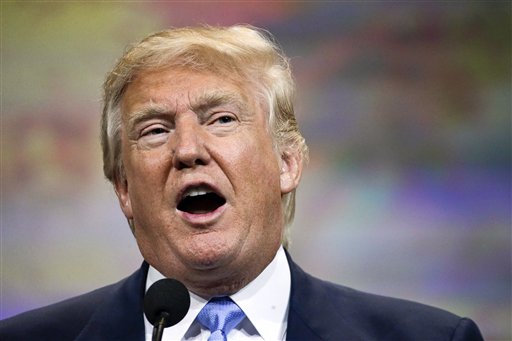Trump seen to ‘soften up’ rhetoric
While Donald Trump may pose a possible threat to Filipinos in the United States with his tough anti-immigration line and his branding of the Philippines as a “terrorist state,” he may “soften up” on his rhetoric now that he is president-elect, according to political scientists.
Jean Encinas-Franco, a political science professor at the University of the Philippines, said it remains to be seen how his presidency would affect the relationship between the two long-standing allies.
“It is hard to predict how he will change from candidate to president,” she told the Inquirer. “But unless there is a definitive move to abrogate our existing institutional agreements, our relationship with the US will transcend all things that are happening.”
Franco said President Duterte’s warming up to Trump came as no surprise, because the two leaders “flatter each other.”
Similarities between Trump and Mr. Duterte have been pointed out, even though Mr. Duterte himself has played down the comparison, calling himself a “small molecule” beside the business mogul.
“Along with Russian President Vladimir Putin, these three have rhetoric that violates traditional norms and values,” Franco said.
Security
However, maintaining territorial and physical security in the region remain a challenge amid a Trump presidency, said Maria Ela Atienza, chair of the UP political science department.
“If the United States decides to pull out its military forces, then the Association of Southeast Asian Nations (Asean) must step up and take a stronger role in ensuring stability in the region,” she said.
Atienza noted that the 10-nation Asean bloc must have a unified response in dealing with its own territorial disputes, in particular over the West Philippine Sea.
Trump has emphasized in his campaign that Japan must take on a stronger military presence in Asia. Atienza noted that other powerful Asian countries, such as China and India, might also take a bigger role in the region.
“If the US presence in Asia is lessened, then we must work on forging and strengthening our alliances with neighboring countries,” she said.
In terms of economic stability, while Trump’s “America first” doctrine may spell a bad outcome for business process outsourcing (BPO) companies in the country, Franco said there was little to fear.
“As long as it is profitable and legal, I believe BPOs will stay in the country,” she said.
Still, Atienza noted that the Philippines should begin looking at alternatives to the BPO sector, given that it has emerged as the country’s second largest source of income.
“We must begin looking into diversifying our exports as well,” she said, adding that overseas Filipino workers in the United States—with their remittances a big driving force in our economy—might also have to start looking for jobs elsewhere.
“We are truly living in different times now,” she said, stressing that Trump’s victory signified a change in world order.
“We used to see US presidents as larger-than-life, but Trump has been widely criticized and offers a different image,” she noted. “With Trump, we might no longer see the United States as the center of the world.”
Immigration
Bangko Sentral ng Pilipinas (BSP) Deputy Governor Diwa Guinigundo said that Trump’s promise of clamping down on immigration would run counter to his goal of increasing America’s “competitiveness, productivity and efficiency.”
“The US benefits from the best of the immigrants, who help rejuvenate and energize the dynamics of the American economy and society,” Guinigundo said.
He said the US’ services sector would be hit hard should his policy shifts be pushed through, given a shortage of highly skilled professionals, such as doctors and teachers.
Guinigundo, however, said the policy “may affect” Philippine remittances from the US, which account for 30 percent of the annual total of around $25 billion.
He said that Trump may find it difficult to convince American businesses to keep jobs in the United States, since outsourcing makes good business sense.
“The outsourcing industry is a win-win solution regardless of the business cycle. If the US economy is not doing well, a business [which has operations here in the Philippines] would be able to save on cost,” he said. “Similarly, if the US economy is doing well, the company would become more competitive, allowing it more expansion opportunities in the United States.”
Last year, the US was the country’s second largest export market, accounting for around $9 billion in total exports.
Guinigundo said that should Trump choose for the US to have a “closer trading system,” this would have repercussions not only in the Philippines but in every country in the world. He noted that the US will be at the losing end since their cost of consumption will rise.
“If he pursues that, he will not be able to do his promise that he would work for the improvement and reinvigoration of the US economy,” he said.
He said that it was too early in the game to see how Trump would handle the economy, even as the Philippine economy was resilient enough to “withstand all of these initial shocks.”
Retail
Retail magnate Hans T. Sy, whose family owns the SM mall chain, echoed Guinigundo, but advised businessmen should be prepared for any eventuality.
“Don’t be discouraged and just continue what you’re doing,” Sy told reporters in Cebu on Friday. “We should not get into an immediate reaction. We should stand (our) path, listen to the policies and move forward.”
Sy said businessmen could readily “adapt to any situation” even as he said a Trump presidency that focuses on its America-first policy would not stop SM’s expansion plans here and abroad.
He added the SM Group would also continue with its expansion in China, where it has earmarked a yearly budget of P20 billion pesos for mall and residential development.
SM currently has six malls in China, adding to its close to 60 malls and 50 retail outlets in the Philippines.—WITH REPORTS FROM JOVIC YEE AND AILEEN GARCIA-YAP















